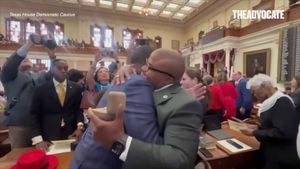A federal judge struck down Arizona's ban on same-sex marriage Friday, refusing to place the ruling on hold while the state considers an appeal.
As a result, Arizona must now allow same-sex couples to marry, reports BuzzFeed, making it the 31st U.S. state where gay, lesbian, and bisexual couples can legally wed.
On Thursday, the state's attorney general conceded that the ban, approved by voters in 2008, is unconstitutional, according to the Arizona Republic. Although the Republican attorney general made that concession before Friday's ruling, he is widely expected to decline to appeal today's ruling, according to the Republic. Attorney General Thom Horne is scheduled to host a press conference Monday to announce his decision, which could include directives to county clerks on when to begin issuing marriage licenses to same-sex couples.
U.S. District Judge John Sedwick issued a brief but decisive ruling Friday morning, finding that Arizona's ban on marriage equality violates the U.S. Constitution.
"The Court of Appeals for the Ninth Circuit recently ruled that substantially identical provisions of Nevada and Idaho law that prohibit same-sex marriages are invalid because they deny same-sex couples equal protection of the law, the right to which is guaranteed by the Constitution of the United States," Sedwick wrote in his four-page ruling. "This court is bound by decisions of the Court of Appeals."
Sedwick's ruling falls in line with recent decisions from the Ninth Circuit Court of Appeals, which holds jurisdiction over nine states, including Arizona.
Because the Ninth Circuit has consistently ruled in favor of marriage equality, the judge in Arizona, appointed by President George H.W. Bush, determined that "an appeal to the Ninth Circuit would not succeed."
Following the Ninth Circuit's ruling in the Idaho and Nevada cases last week, Colorado and Nevada embraced marriage equality, while just days later, a federal judge in Alaska cited the Ninth Circuit precedent and struck down that state's ban on marriage equality. After a brief delay as Idaho officials attempted to appeal that ruling, same-sex couples in the Gem State began marrying on Thursday. Montana is also disputing whether the Ninth Circuit ruling applies.
As for the rest of the states covered by the Ninth Circuit, California, Oregon, Hawaii, and Washington already have marriage equality. Same-sex couples in Utah were granted the freedom to marry after the U.S. Supreme Court last week declined to review a series of pro-equality rulings from lower courts, letting those decisions stand.
That just leaves Alaska, where a federal judge struck down the state's ban on marriage equality earlier this week, refusing to put his ruling on hold. However, the state's Republican attorney general was granted a temporary stay on that decision by the Ninth Circuit, pending the state's appeal to the Supreme Court. That stay expires at noon today, meaning unless the Supreme Court grants Alaska's request, marriage equality will take effect in Alaska Friday afternoon.
Whether circuit court rulings that were upheld by the Supreme Court apply then to other states in that circuit is a hotly contested legal argument in a number of states. For example, the Supreme Court let stand an equality ruling from the Fourth Circuit in a case out of Virginia, but South Carolina, which is also within that jurisdiction, has so far fought legalizing same-sex marriage. By contrast, also in the Fourth, West Virginia dropped its defense of a ban and has already begun marrying couples.

































































































































